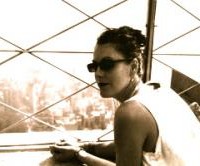Life is hard and everyone dies.
Through it all, people love each other, and people hurt each other. By a certain age, we are obligated to recognize how arduous and complicated living and loving really are. We are obligated to be more accepting and less judgmental. Black and white fall away, and forgiveness takes center stage.
The question is how much are you willing to work for healing? Time is not the great healer. Time on its own is jack shit. Work is the great healer—working for healing with a willingness to engage, to open, to interact, to rebuild. To stitch and soothe the broken and inflamed. Sometimes we must do these things all by ourselves, sometimes that is in fact the only option we have. The important thing is that we do them at all, as quickly and as constantly as we can.
Because we only have a little bit of time to do the things we envision ourselves doing.
Because everyone dies.
Lately, I’ve been seeing this up close and too often. Two friends lost young adult sons to illness in December. Earlier this fall, cancer claimed Mary Ann, a beautiful writing student who attended my summer solstice writing retreat. And then there was the sudden death of the mother of one of my writing students a few weeks ago.
Death is inevitable. You’ve heard it before. When Mary Ann contacted me last March about the summer solstice retreat, she told me she had stage 4 cancer and that the retreat was on her bucket list. I told her that was a tall order for me, but that I would do my best to live up to it.
Part of what Mary Ann taught me is that you can’t always wait for a better time, and you certainly shouldn’t wait until you have only a small amount of time left.
My day job is editing and writing at the University of Minnesota in the School of Public Health. The route I walk to get to my office takes me through a long and circuitous maze of buildings. The door I first enter is that of the University hospital. Every time I walk through those doors, I see people in their hospital gowns and wheelchairs, their tall tree things on wheels with the bags and tubes and IVs coming and going.
I see couples holding hands and I see people with pain and fear etched on their wide open faces. Sometimes I see people on gurneys, as vulnerable as anyone can ever be, and sometimes I see people running through the hall in the searing hope that they are not too late.
I don’t want to be too late. I know I am going to die, you are going to die, we all are. We don’t know how or when, that’s uncertain. In fact, all of life is uncertain, every single minute of it, except death. Death is the one certain thing.
The uncertainty is the beautiful wild ride of today. Now. This minute.
Doris Lessing, who died recently at age 94, said, “Whatever you are meant to do, do it now. The conditions are always impossible.”
For me, this boils down to loving my husband and kids with every ounce of fierceness I’ve got, showing it every single chance I get, and working feverishly to heal what’s broken while wildly and passionately appreciating what’s not, openly and with abandon. And meanwhile writing my heart out.
Bam.
Thinking about death (and not fearing death by the way, that’s not what I am talking about) can frame the way we see our lives. Accepting the inherently finite nature of our time here in the “soft animal of our bodies” casts a clearer light on the series of seemingly irrelevant decisions we make each day.
Decisions that cumulatively come to define us.
As Annie Dillard so aptly put it, “How we spend our days is, of course, how we spend our lives.” Or as my hero Cheryl Strayed says, “these useless days will add up to something.” But, I would add, only if you make them. And the clock is ticking. Today is the one day we know we have. Start now.
Enough
By David Whyte
Enough. These few words are enough.
If not these words, this breath.
If not this breath, this sitting here.
This opening to the life
we have refused
again and again
until now.
Until now
~
Relephant:
How to Say Screw It & Live Brilliantly.
Want 15 free additional reads weekly, just our best?
Get our weekly newsletter.
Editor: Catherine Monkman
Photo: flickr/Kalyan Kanuri

 Share on bsky
Share on bsky




Read 7 comments and reply